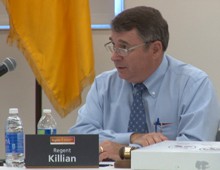- Slug: Regents-Costs,550
- Sidebar: Costs by school.
- Photo available below
By SAMANTHA SHOTZBARGER
Cronkite News
TEMPE – Issac Ortega, president of Associated Student of the University of Arizona, says students don’t relish the idea of having to spend more on a college education after deep state funding cuts to universities.
“But we do understand that we have to ensure some quality,” he told the Board of Regents via videoconferencing at a meeting Monday night.
“I think the message from our students to the senior leadership is very, very clear: It’s not our student’s fault, it’s not our administration’s fault, and it’s certainly not the fault of our wonderful regents,” Ortega said.
Student after student took to the podiums set up on eight campuses around the state, connected through a live broadcast across the multiple locations, to tell the regents they understand the need for proposed tuition increases – even thanking the regents.
All three public universities have proposed increases to help offset a $99 million cut in state funding for the fiscal year beginning July 1. Regents are scheduled to vote on the plans in June.
ASU, for example, wants to have resident undergraduate students pay an additional $321, presented as a one-time surcharge, while nonresident undergraduate students would pay an additional $955.
Students in some programs, like Barrett, the Honors College, and new students entering the Walter Cronkite School of Journalism and Mass Communication, would have to pay an additional fee.
Daniel Martin,19, a Barrett student and Undergraduate Student Government senator, told the regents he understands the proposed $250-per-semester program fee for those in the honors program.
“While I by no means celebrate the fee increase for Barrett, the Honors College, I along with many of my colleagues understand that it is necessary,” said Martin, a physics major. “Furthermore, I want to commend Barrett, the Honors College, for their willingness to work with students, to dictate where the fee increase will go along with the transparency they’ve approached this issue.”
[Hear Martin explain his support after the meeting.]
Mark Killian, the board’s chairman, said the students understand that elected state leaders, not the Board of Regents, caused the problem. He said involving students in developing the proposals was critical.
“If we’re going to be successful in higher education today, we have to have the students involved in what we’re doing,” he said.
Still, Killian said, seeing students discuss taking on a bigger financial burden “kind of turns my stomach a little bit.”
Meanwhile, regents are considering a proposal that will reduce tuition for immigrants participating in the Deferred Action for Childhood Arrivals program. Under state law, Arizona residents who can’t prove U.S. citizenship pay out-of-state tuition, which on average is more than double in-state tuition.
Under the plan, which regents will vote on in June, DACA participants who live in Arizona would pay 150 percent of the cost of in-state tuition.
German Cadenas, president of the ASU Graduate and Professional Student Association, said the change would benefit the entire state because DACA participants are the professionals of tomorrow.
“There are thousands of DREAMers who are not able to access education because right now they’re being charged out-of-state tuition, which is unaffordable,” he said. “It’s unattainable right now.”
^__=

Mark Killian, chairman of the Arizona Board of Regents, participates in a hearing Monday night on university plans for raising student tuition and fees. (Cronkite News Photo by Lauren Handley)